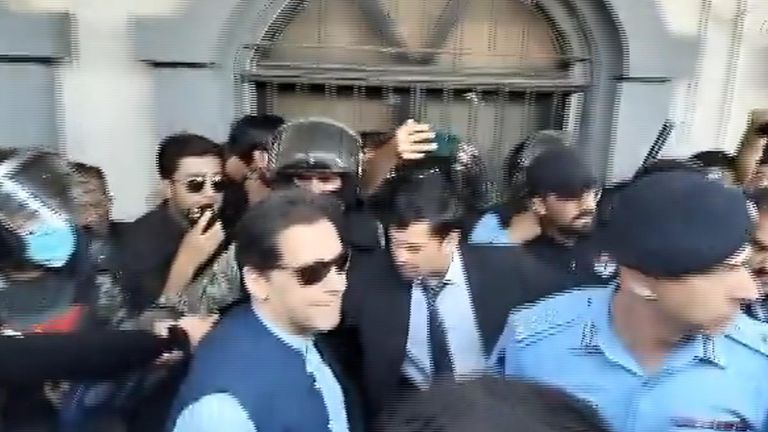Protests for and against Imran Khan in Islamabad
Pakistan’s Supreme Court is accused of favouritism vis-à-vis the former prime minister, who, released on bail, urged his supporters to continue protesting. The country's institutions are now against each other. Some hope that an agreement on the election date might be possible. The “situation does not benefit democracy, nor can it solve economic instability.” Fr Khalid Rashid Asi told AsiaNews. Yesterday Catholics in Faisalabad prayed for the country.
Lahore (AsiaNews) – The situation in Pakistan remains tense after Pakistan’s Supreme Court ruled that former Prime Minister Imran Khan’s arrest was unlawful and ordered his release.
The ruling coalition, the Democratic Movement of Pakistan (PDM), which is made up of the Pakistan People's Party (PPP) and the Muslim League (PML-N), organised a sit-in in protest against the court’s decision, which is seen as favouring Khan, leader of the Pakistan Movement for Justice (Pakistan Tehreek-e-Insaf, PTI), in the opposition for more than a year.
After his release on bail, Khan called on his supporters to continue protesting across the country. “Freedom des not come easily. You have to snatch it. You have to sacrifice for it,” the 70-year-old said in a speech posted on social media.
Khan blames the military for his arrest on 9 May, which his PTI supporters see as a "kidnapping". His arrest had sparked violent anti-government protests throughout the country with more than 1,500 people detained.
Although the Internet has been restored, many users still cannot access social platforms.
After he lost a vote of no-confidence in April 2022, the former cricket champion began a protest campaign calling for early elections, initially scheduled for October 2023.
After he led his party to dissolve the provincial assemblies of Punjab and Khyber Pakhtunkhwa, where it had a majority, the government resisted the Supreme Court's decision to hold elections on 14 May and the issue is currently being litigated.
“Since Imran Khan was removed from office after losing the no-confidence vote, the government, the opposition, and others like the judiciary are challenging the primacy of the constitution,” said human rights activist Suneel Malik speaking to AsiaNews.
“Already on the choice of Punjab’s governor and chief minister, and the date of the general election, the Supreme Court’s rulings have not been accepted by political parties because they are seen as favouring only one party.
“On the other hand, PTI supporters think they can burn down government and private buildings, destroy the country's peace , and consider themselves above the law,” Malik added.
“Government and opposition should sit down together and decide the date of the elections. While the Supreme Court should ensure fair trials and guarantee justice for all.”
Instead, it seems that the country's institutions have turned on each other. On Friday, the Supreme Court ruled that the government cannot re-arrest Khan, who is involved in multiple court cases, including one of bribery worth hundreds of millions of rupees.
For its part, the National Assembly today set up a five-member committee to file references against the justices of the Supreme Court.
“It seems that every institution in Pakistan is fighting to demonstrate its power,” said Fr Khalid Rashid Asi, parish priest at Holy Rosary Church in Faisalabad, speaking to AsiaNews.
“It's like in a mental hospital where everyone tries to treat each other,” noted the clergyman who is also diocesan director of the Justice and Peace Commission. “But this situation does not benefit democracy nor cannot solve economic instability. All institutions should remain within their scope, as written in the Constitution of Pakistan."
"I strongly believe that politicians should not use religion in politics, avoiding instigating people's feelings. But I also think that journalists in Pakistan are not doing their work well: they write and speak only for their favourite leaders and parties, without looking at democracy, peace and stability in the country.”
For Fr Rashid, "If political parties really loved this country, they should sit together and take concrete actions. Yesterday, Mother's Day, we celebrated a Day of Prayer for Pakistan in our church, because we believe that our country is like a mother. We asked God to save this state, praying for harmony.”
05/11/2024 13:50







.png)










